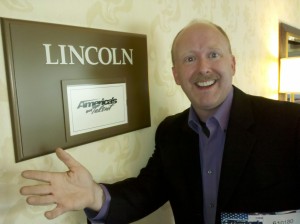Ever have that experience of thinking of all the great ways to answer a question long after the conversation is over? Yeah, me too.
Matt Bailey graciously invited me to be part of his podcast series on ventriloquism. You can hear the full interview here at Ventriloquism Weekly. Aside from my session, if you’re at all serious about ventriloquism, you should check out that podcast. He’s doing a great job with it.
The key question Matt was hoping to answer during his interview with me was, “How do you make the leap to being a full-time self-employed ventriloquist?” And, of course, it was only after our podcast time was over that most of the good stuff came to mind. Meaning, 3:30 in the morning I woke up with all the voices in my head screaming, “You should have said…”
So, in an attempt to capture a few of those extra bits, and quiet the voices that are keeping me awake, here we go. We’ll do this in FAQ format.
Q: How much money should you have in the bank before you pull the plug from your day job?
A: It depends. Really. I’m not being a Smart Alec when I say that. It completely depends on your personal situation. Do you have a family? Are you the primary income producer of that family? To what lifestyle are you accustomed?
Q: Say more
A: What level of income and financial stability are you used to? If you are used to a steady paycheck, especially a hefty one, it’s going to be more difficult to step away from that. You can ease that by having more in savings. People who have never stayed in upscale hotels will be more comfortable in a Motel 6 for much longer than those who have become accustomed to an establishment with a lot full of Mercedes and BMWs.
Q: No, really, how much money will it take?
A: I can’t give you a $ amount. You might like shopping at Walmart. I don’t. As a general rule, here’s what I suggest. Figure out your monthly expenses. Estimate how long it’s going to take you to start generating that level of income (after business expenses!) from your business. Now double it. Why? Because it’s going to take you a at least twice as long as you think.
Q: What has been the most challenging aspect of making the change?
A: Healthcare. Hands down, the single biggest issue. Go back through my posts from a few years ago and you’ll see I had that same challenge the first time around. I am not happy about numerous impacts of the Affordable Care Act, aka Obamacare, but the promise of being able to get insurance coverage, whatever the cost, is huge. Can you say, “preexisting conditions”?
Q: What is the biggest thing you didn’t cover in the podcast?
A: This is a business. If you want to know how to go from day job to full-time ventriloquist / performer / speaker / whatever, learn business. Talk to other small business owners in all kinds of fields.
Q: Anything else?
A: I touched on this in the interview, but I can’t stress it enough. Your success or failure in this business is all up to you. How hard are you willing to work? Are you willing to accept feedback, real feedback, sometimes painful feedback, and make the adjustments necessary? As an independent business owner, the only person you have to blame if things aren’t going well is the person in the mirror. Economy is bad? Deal with it.
Well, that’s about it. The rest is in the podcast. I hope this is useful to at least one person out there. If so, then it was worth it. And if this is all complete gobbledegook, well, remember I got up at 3:30 in the morning to write it.



 Posted by David Crone - ImNoDummy.com
Posted by David Crone - ImNoDummy.com 


You must be logged in to post a comment.